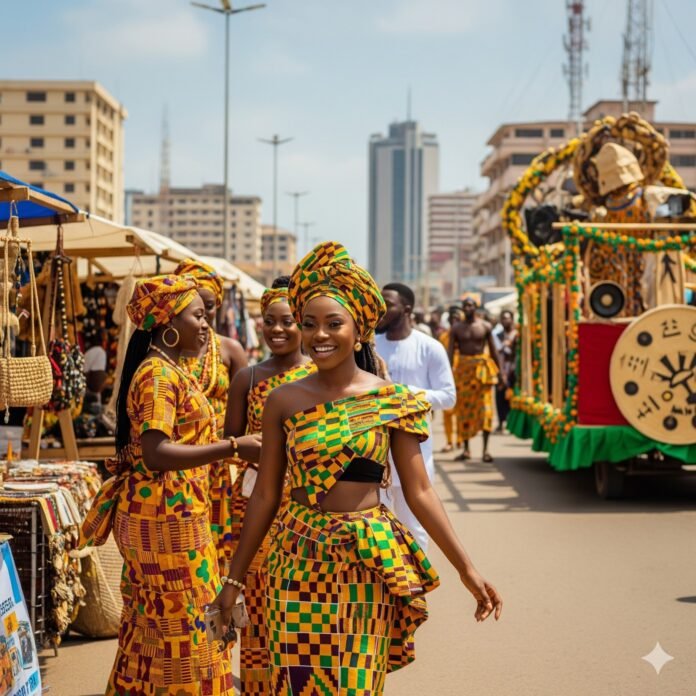Introduction
Across Africa, festivals are more than colorful displays of dance, food, and costume. They are cultural archives, living reminders of history, spirituality, and identity. From the Aboakyer Festival in Ghana to the Timkat Festival in Ethiopia, these gatherings preserve values passed down for centuries. But as Africa modernizes, a pressing question arises: do traditional festivals still matter in today’s digital, urban world? For millions of Africans, the answer is a resounding yes. Festivals are not just heritage; they are identity in motion.
Festivals as Cultural Memory
Traditional festivals are repositories of history. They tell stories of migration, battles, religious devotion, and community survival. The Homowo Festival of the Ga people in Ghana, for example, commemorates a time of famine and the community’s triumph over hunger. Similarly, Timkat in Ethiopia celebrates the baptism of Jesus with parades, chants, and water rituals that unite entire cities.
These are not simply rituals; they are historical texts written in song, costume, and movement. In societies where written records were limited, festivals preserved knowledge and passed it to younger generations.
Social Cohesion and Identity
In urban Africa, where globalization often fragments traditional structures, festivals create unity. They bring home diaspora members, reconnect urban youth with rural roots, and reinforce community belonging. For example, the Durbar Festival in Northern Nigeria showcases horse parades, music, and elaborate dress. Beyond entertainment, it unites Hausa-Fulani communities under shared heritage.
In Ghana, younger generations increasingly see festivals as an anchor of identity, counterbalancing the pull of Western media. For a millennial who spends most of the year online, attending a festival is a reminder that they are part of something older and larger than themselves.
Festivals as Economic Engines
Modern festivals are also economic lifelines. They attract tourists, create jobs, and generate revenue for local artisans. The Lake of Stars Festival in Malawi, blending traditional and contemporary music, draws international visitors and boosts the tourism sector. Similarly, Ghana’s Chale Wote Street Art Festival injects millions into Accra’s economy, while empowering local artists to showcase their creativity on a global stage.
In many African cities, festivals are now central to cultural tourism strategies. Governments recognize that preserving tradition can also mean creating sustainable income.
Challenges and Critiques
Despite their importance, traditional festivals face challenges.
Commercialization – Some critics argue festivals risk losing authenticity as they cater to tourists. Rituals once sacred are sometimes shortened or dramatized for cameras.
Generational Gap – Younger Africans may see festivals as outdated, preferring digital entertainment.
Religious Tensions – In some communities, Christian and Islamic groups oppose traditional festivals, labeling them “pagan.”
Infrastructure Issues – Poor roads, sanitation, and overcrowding often mar festival experiences.
These critiques are valid, but they also highlight the need for modernization that respects, not erases, tradition.
Counterpoint: Adaptation, Not Extinction
Critics who predict the decline of traditional festivals often underestimate their adaptability. Just as storytelling moved from firesides to podcasts, festivals are embracing modern platforms. Today, festivals are livestreamed on Facebook and TikTok, reaching diasporic audiences worldwide. Younger generations remix traditional drumming with hip-hop beats, creating hybrid performances that resonate across age groups.
The fact that festivals evolve does not dilute their essence; it ensures survival.
Why Festivals Matter Today
Cultural Continuity – They prevent the erasure of indigenous knowledge.
National Pride – They project Africa’s diversity to the world, boosting soft power.
Tourism & Development – They generate income and support artisans, musicians, and local businesses.
Intergenerational Bridges – They connect elders and youth, transmitting values across generations.
Case Study: Aboakyer Festival, Ghana
During the Aboakyer, young men of the Effutu people hunt a live deer without weapons. The deer is then offered to the gods in gratitude for protection. For outsiders, the ritual may appear strange, but for the Effutu, it is a reenactment of resilience, faith, and obedience to tradition. In recent years, the festival has attracted thousands of visitors, blending spirituality, cultural pride, and tourism. It demonstrates how ancient rituals can thrive in modern contexts without losing meaning.
Conclusion
Traditional festivals in Africa are not fading relics of the past; they are living expressions of identity. While modernization poses challenges, it also opens new possibilities for preservation and adaptation. Festivals remain vital because they remind Africans — and the world — that culture is not static. It evolves, adapts, and continues to shape how people see themselves and their communities.
For Africa’s youth, festivals are not just about drumming and dance. They are about belonging. In a world that constantly demands assimilation, festivals whisper the truth of identity: we are still here, and we know who we are.
References
UNESCO (2021). Safeguarding Intangible Cultural Heritage in Africa.
Ghana Tourism Authority (2023). Festivals of Ghana.
BBC Africa (2022). “Traditional Festivals in a Modern World.”
Quartz Africa (2021). “The Economic Power of African Festivals.”
African Studies Review (2020). Religion and Ritual in Contemporary Africa.








